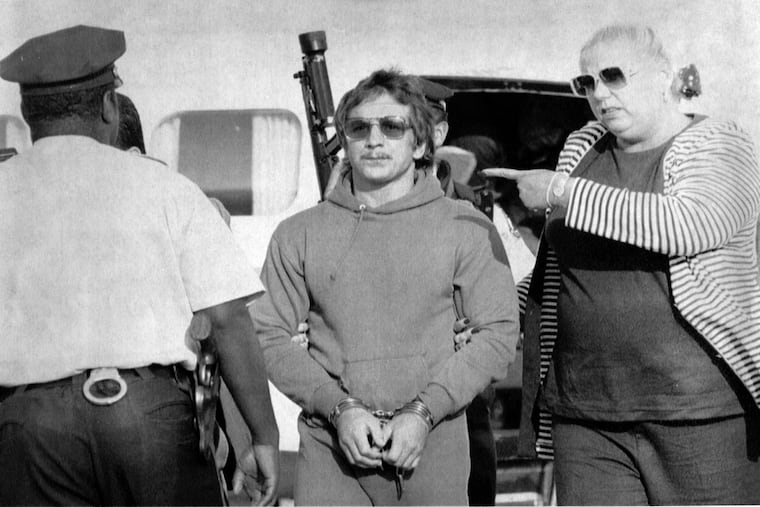A 1982 murder, a capital sentence, two escapes and now, a reprieve from death row
A Philadelphia man with a troubled and colorful legal history was spared from death row Thursday, after the District Attorney's Office agreed to resentence him to life in prison.

Three decades ago, Joseph Kindler was a serial burglar convicted of murder after tossing a potential witness into the Delaware River with a concrete block tied around his neck.
Kindler then escaped from prison twice — once with the help of another inmate, the other time using bed sheets as a rappelling line. And he nearly caused an international incident when officials in Canada, where he'd fled after his first escape, initially balked at extraditing him back to Philadelphia to face a death sentence, an illegal punishment north of the border.
Kindler's colorful legal history likely came to an end Thursday, when the Philadelphia District Attorney's Office agreed to vacate his death sentence and instead keep him in prison for life.
"What I did," Kindler said in court, "still haunts me to this day."
Kindler's release from death row fits with the stance of District Attorney Larry Krasner, who on the campaign trail last year pledged that he would never seek to impose capital punishment.
The position went unmentioned at the Criminal Justice Center during Kindler's hearing; Anthony Voci, head of the district attorney's homicide unit, instead said prosecutors agreed with Kindler's lawyers that he had made "an extraordinary adjustment while in prison," citing his becoming a Jehovah's Witness and even inventing, from his cell, a patented wireless smoke detector.
But one of Kindler's attorneys, public defender Andrea Konow, said after the hearing that she had been fighting in court for Kindler to be removed from death row since 2013 — and it wasn't until after Krasner took office that she felt sustained agreement that Kindler deserved to have his death sentence dropped for good.
"We're extremely pleased," Konow said. "Mr. Kindler has truly made a remarkable adjustment."
Kindler became eligible for resentencing in 2011, when the U.S. Court of Appeals for the Third Circuit ordered his death sentence vacated due to ineffective assistance of counsel.
At issue was the fact that Kindler, at trial, had barely any witnesses or evidence presented on his behalf as jurors weighed capital punishment. The practice, known as mitigation, is standard today but was a relatively new concept when Kindler was tried in 1983.
He had been arrested a year earlier, after the body of 18-year-old David Bernstein was found in the Delaware River near Bensalem with 20 head wounds from a baseball bat and a chunk of concrete tied around the neck. Bernstein, before he was killed, had agreed to testify against his friend Kindler regarding burglaries the two had committed together.
While awaiting trial on murder charges, Kindler twice escaped from prison. The first time, in 1983, he and another convicted murderer, Reginald Lewis, escaped after Lewis flooded his cell, yelled for help, and assaulted the guard who responded.
Lewis was caught in Buffalo, but Kindler remained on the lam for seven months, until he was arrested by Canadian police for committing a burglary outside Montreal. Authorities hesitated to return him to Philadelphia to face the death penalty because they had outlawed the punishment. But they eventually relented out of fear that their country would become a safe haven for American killers fleeing the law.
In 1986, however, before he had an extradition hearing, Kindler broke out of a Montreal jail when fellow inmates lifted him onto the prison roof through a skylight and he rappelled to freedom using a rope of bed sheets. He was discovered two years later in the Canadian province of New Brunswick after being recognized on the television show America's Most Wanted. He finally was extradited to Philadelphia in 1991.
In court Thursday, Kindler, wearing a blue prison uniform and eyeglasses, acknowledged his troubled history while reading from a statement. But he said he had become a Jehovah's Witness upon his return to Pennsylvania, and accepted responsibility for his crimes.
No family members were in attendance, but Konow said Kindler's father — who is in his 80s and in poor health — had visited his son in prison regularly for many years. The elder Kindler converted to become a Jehovah's Witness after interacting with his son, Konow said.
Speaking to Common Pleas Court Judge Rose Marie DeFino-Nastasi, Kindler — who will be returned to a general prison population after years in solitary confinement — said he hopes he will be forgiven for his actions.
"I am truly sorry," he said, "for what I've done."